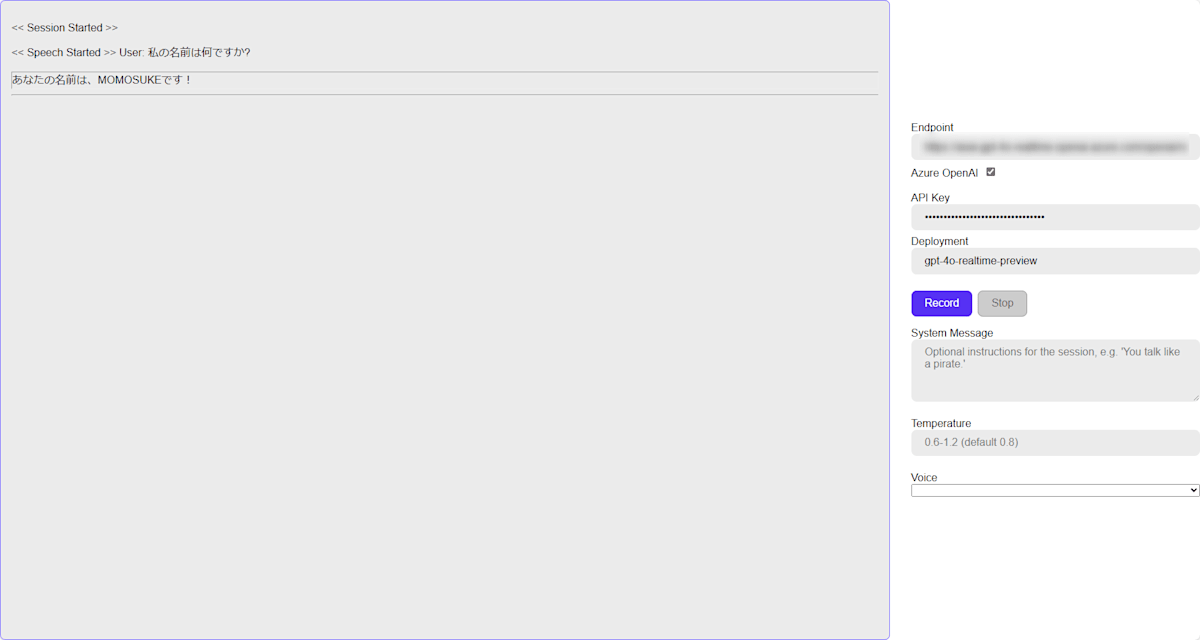AOAI GPT-4o Realtime API で Function Calling を試してみる
概要
Azure OpenAI GPT-4o Realtime API で Function Calling (Tools) が使えるようなので SDK 内の JavaScript サンプル アプリに機能追加する形で実装して、その動作を確認してみます。
Azure OpenAI の GPT-4o Realtime API おさらい
2024 年 10 月 1 日に Azure OpenAI で GPT-4o Realtime AP モデルがデプロイ可能となりました。
OpenAI のモデル自体の情報については、npaka さんのこちらの記事が分かりやすいので、詳細は割愛させていただきますが、要するに低遅延の音声会話を実現する GPT モデルであり、それが Azure OpenAI サービスでサポートされました。
開発方法
執筆時点でプレビュー中の GPT-4o Realtime API ですが、SDK が公開されております。
以下のように WebSocket 周りの実装が抽象化されており、直観的に API サーバーとのコミュニケーションが行えるようになっています。
Before (OpenAI API)
const url = "wss://api.openai.com/v1/realtime?model=gpt-4o-realtime-preview-2024-10-01";
const ws = new WebSocket(url, {
headers: {
"Authorization": "Bearer " + process.env.OPENAI_API_KEY,
"OpenAI-Beta": "realtime=v1",
},
});
After (Azure OpenAI GPT-4o Realtime API SDK)
realtimeStreaming = new LowLevelRTClient(
new URL(endpoint),
{ key: apiKey },
{ deployment: deploymentOrModel }
);
Function Calling のサポート
MS Learn には書かれていませんが、SDK には Function Calling がサポートされている旨が記載されています。
Works with text messages, function tool calling, and many other existing capabilities from other endpoints like /chat/completions
使い方
会話開始時に送信する JSON に tools プロパティを追加します。
{
"type": "session.update",
"session": {
"voice": "alloy",
"instructions": "Call provided tools if appropriate for the user's input.",
"input_audio_format": "pcm16",
"input_audio_transcription": {
"model": "whisper-1"
},
"turn_detection": {
"threshold": 0.4,
"silence_duration_ms": 600,
"type": "server_vad"
},
// ↓ ここに tools プロパティを追加
tools: [
{
type: "function",
name: "get_my_name",
description: "Get the name of the user",
},
],
}
}
会話の中で Function を使うという判断になった場合、Function に渡す引数の検討なども行った結果、サーバーは item.type が function_call の response.output_item.done コマンド メッセージを送信してきます(以下例)。
// `response.output_item.done` コマンド メッセージ
{
"type": "response.output_item.done",
"event_id": "event_AQz0q9o4SIl68fuMPKBXN",
"response_id": "resp_AQz0pjscf3X2HryMovLZU",
"output_index": 0,
"item": {
"id": "item_AQz0pX5Q7UAMM3z8qzLHY",
"object": "realtime.item",
"type": "function_call",
"status": "completed",
"name": "get_my_name",
"call_id": "call_cTE3ifBo5XukndV8",
"arguments": "{}"
}
}
このメッセージを拾って、Function の処理を行います。Conversation のアイテムとして追加した上で、response.create コマンド メッセージを送信することで、Function の処理が完了したことをサーバーに通知し返答の生成を促します。
case "response.output_item.done":
const { item } = message;
if (item.type === "function_call") {
console.log("message", message);
console.log("function_call", item);
if (item.name === "get_my_name") {
realtimeStreaming.send({
type: "conversation.item.create",
item: {
type: "function_call_output",
call_id: item.call_id,
output: get_my_name(),
},
});
realtimeStreaming.send({
type: "response.create",
});
}
}
break;
結果

現時点で不明瞭な点
Function を判定できるコマンドが 2 種類ある
Fucntion とそれに渡す引数を含むコマンドとして、response.function_call_arguments.done と response.output_item.done がある。どちらを採用すればいいのか現時点では不明です。
Function の実行結果を送るタイミング
上記の通り、2 つのどちらかのコマンドを受け取ったタイミングで「関数実行 → 返答生成依頼」を行えるが、SDK の README に以下の記述があります。
Sending the response.create command before the paired response.done command for the prior response arrives (e.g. immediately after an response.function_call_arguments.done or response.output_item.done) may produce unexpected behavior and race conditions.
つまり、厳密には「関数実行 → response.done コマンド受信確認 → 返答生成依頼」のステップを踏む必要があると私は解釈しました。現状、特に気にせず関数の実行結果を取得次第、送っているのですが動作しているのですが、本番環境として運用する際は気にした方が良いかもしれません。
まとめ
今回は引数の無い関数を呼び出す形で Function Calling を試してみました。
実際には引数を取る関数を呼び出すことが多いと思います。引数の取り方や Function の実装方法については、SDK のドキュメントを参照してください。
参考: SDK の tools 定義例
オブジェクトを引数に取る関数の定義例です。オブジェクトのプロパティを指定することや、Enum 型もサポートされています。
"tools": [
{
"type": "function",
"name": "get_weather_for_location",
"description": "gets the weather for a location",
"parameters": {
"type": "object",
"properties": {
"location": {
"type": "string",
"description": "The city and state e.g. San Francisco, CA"
},
"unit": {
"type": "string",
"enum": [
"c",
"f"
]
}
},
"required": [
"location",
"unit"
]
}
}
]
Discussion